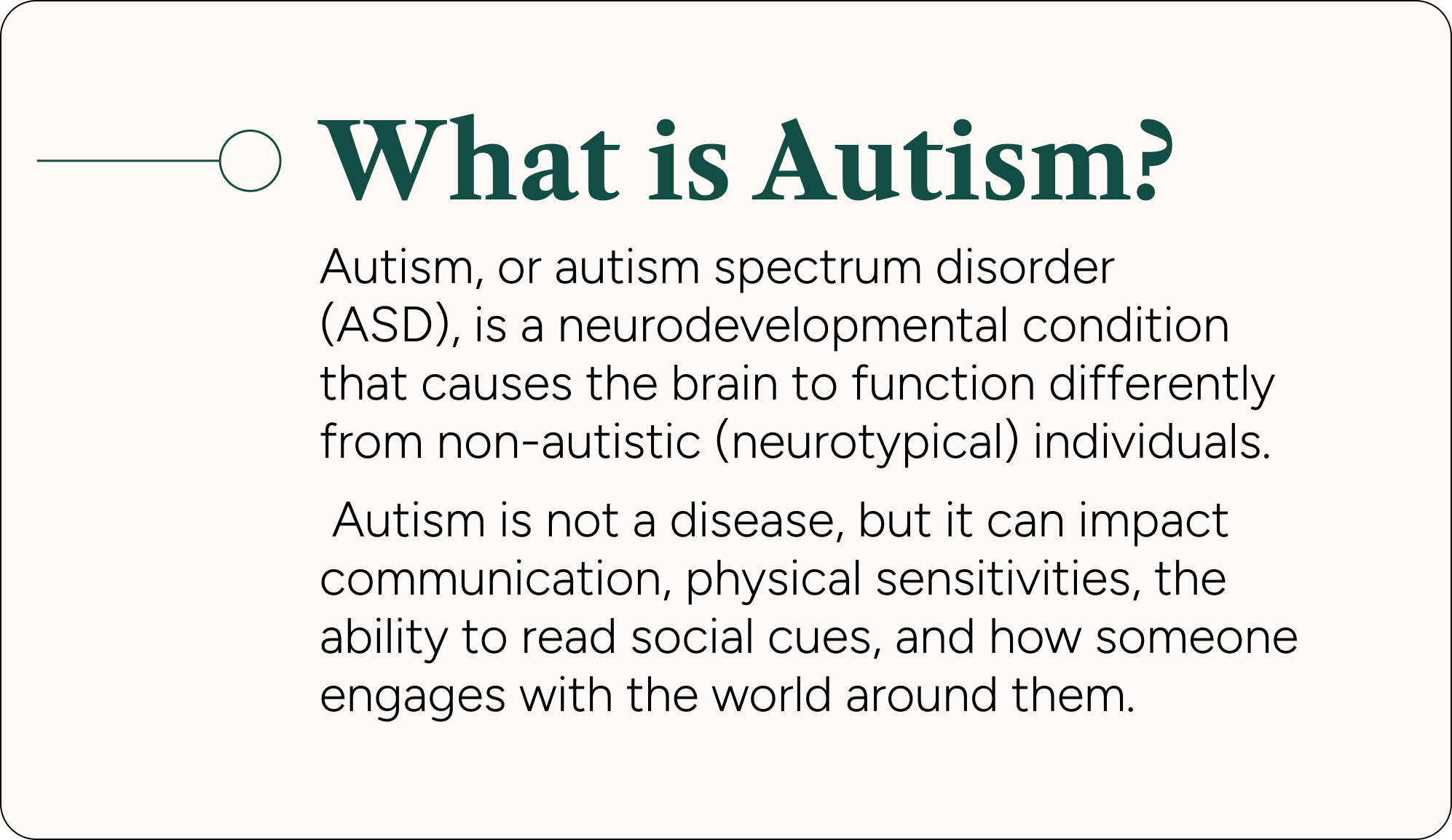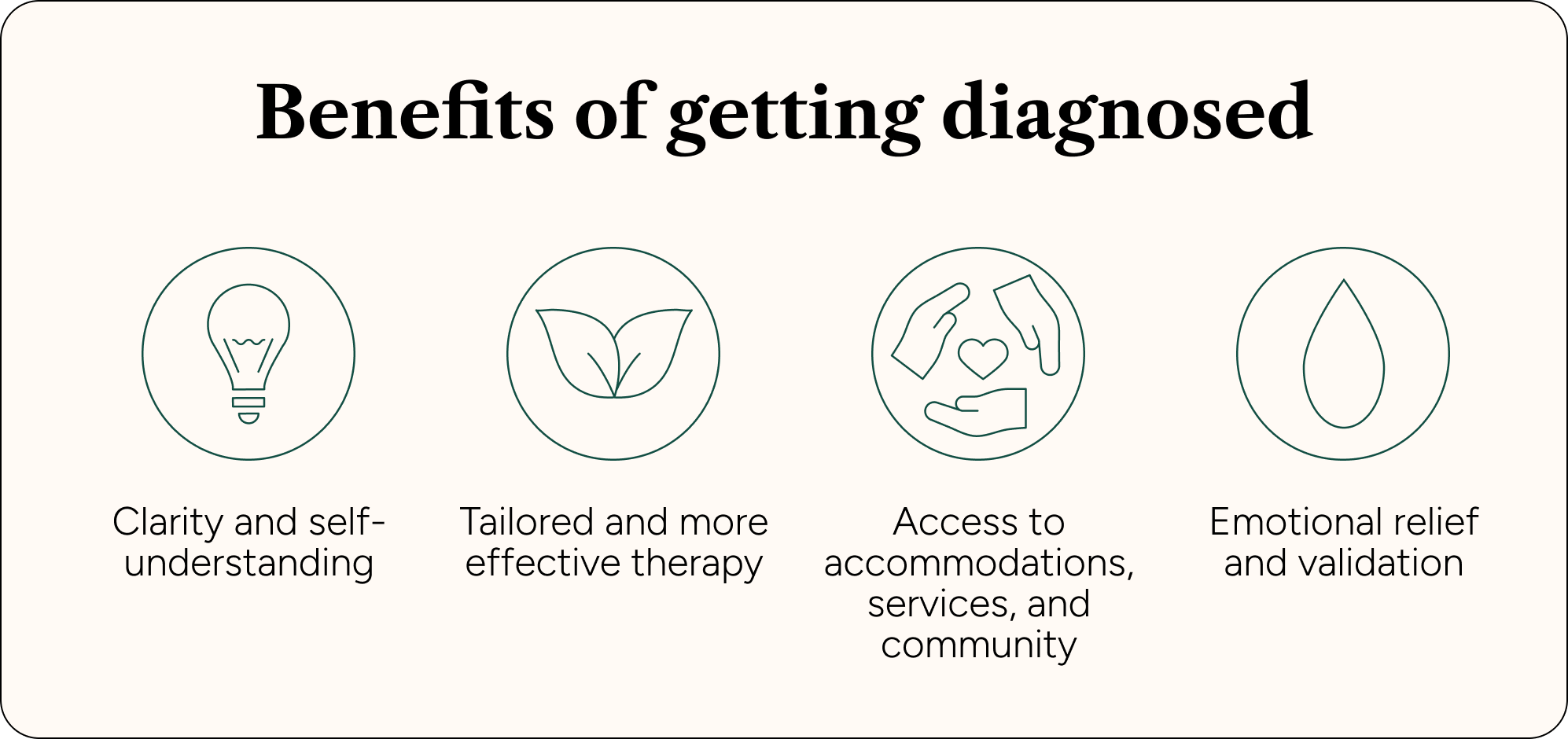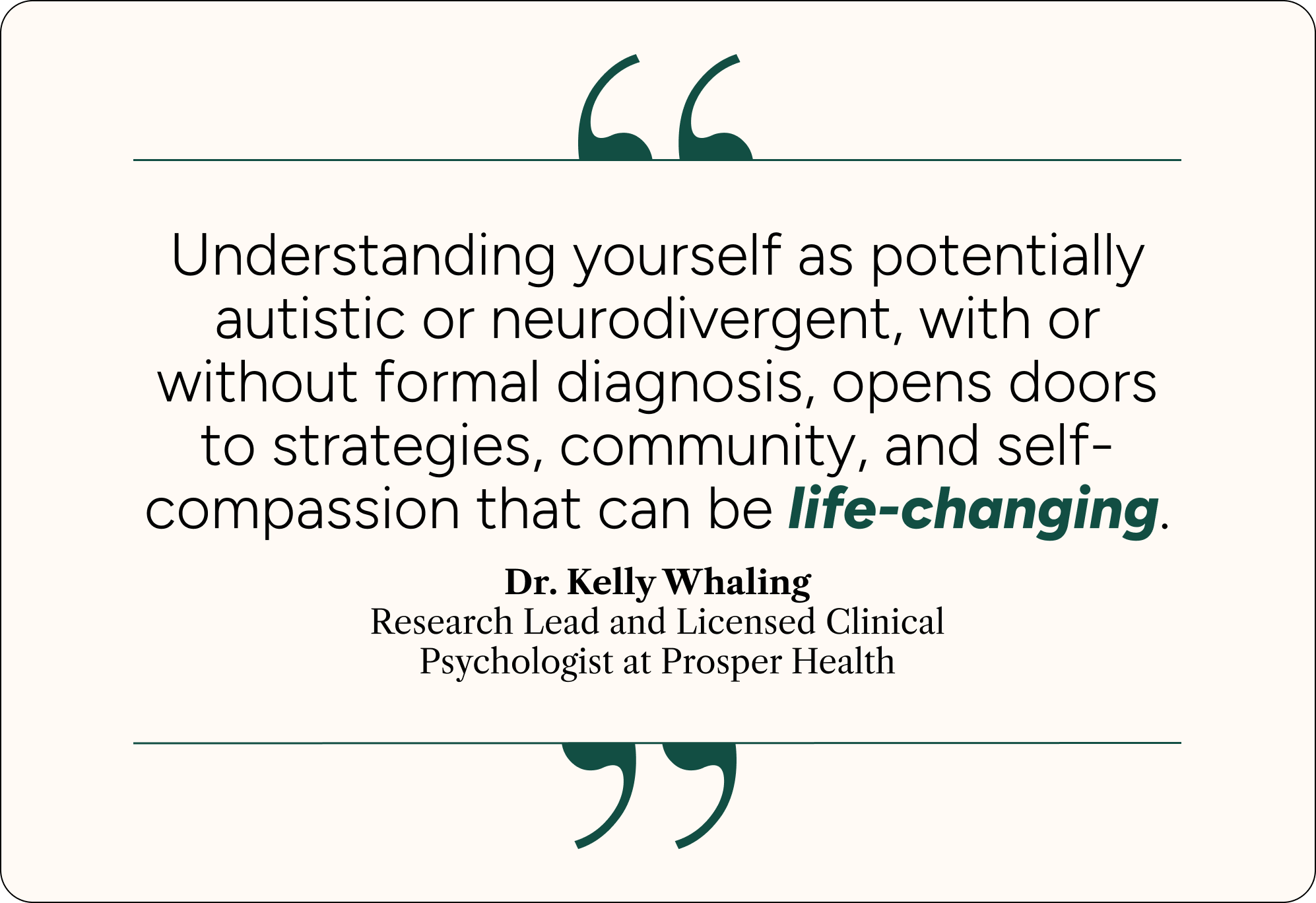Key Takeaways
- Autism is often associated with childhood, but many people get diagnosed in adulthood after years of masking.
- A formal autism diagnosis can open several doors: Accommodations, community, self-acceptance, validation, emotional relief, and more effective therapy and support.
- A formal autism diagnosis requires self-reflection, finding an experienced provider, and completing the necessary steps for clinical evaluation.
- Prosper Health’s autism assessment process includes thorough written evaluations, two 90-minute clinical interviews, and one 45-minute feedback session.
- Prosper Health can provide support every step of the way, whether you’re contemplating a formal autism assessment or seeking post-diagnosis resources.
Have you ever thought about getting tested for autism?
Perhaps because, as both a child and an adult, you’ve always felt misunderstood or out of sync with your peers. You could never quite put your finger on why you were different, but deep down, you knew there had to be an underlying reason. As our collective understanding of autism and diverse neurotypes grows, more and more people are realizing their autism might have been missed when they were kids and are now seeking a diagnosis in adulthood.
The day we received my daughter’s autism diagnosis, it felt like the world finally opened its doors to our family. But so many autistic individuals have lived their entire lives without knowing they are neurodivergent, and as a result, aren’t getting the support they need. Luckily, it’s never too late to get an autism diagnosis, but the process can feel intimidating. Where do you even start? Especially when autism testing options for adults, as well as data on autistic adults, are still relatively limited.
For example, the Centers for Disease Control estimates that 1 in 45 adults in the United States is autistic, but many are undiagnosed.
The good news is that there is growing recognition of the need for more accessible and respectful autism assessments and diagnoses. This has led to a push to improve the overall autism testing process for adults in recent years. According to a study published in JAMA Network Open, the rate of diagnosis in young adults (age range: 26-34) rose 450% between 2011 and 2022.
Getting yourself tested for autism can feel like an overwhelming task. That’s why Prosper Health is here to provide you with a step-by-step, supportive guide that will give you everything you need to know about the diagnostic process, from self-reflection to post-diagnosis support and resources.
What It Means To Be Autistic — And Why Many Adults Go Undiagnosed
Autism, or autism spectrum disorder (ASD), is a neurodevelopmental condition that causes the brain to function differently from non-autistic (neurotypical) individuals. Autism is not a disease, but it can impact communication, physical sensitivities, the ability to read social cues, and how someone engages with the world around them.
Above all, it’s important to remember the word “spectrum” whenever talking about autism: ASD symptoms, as well as their severity, vary significantly by person. In other words, some individuals have sensory sensitivities, while some require sameness (aka a strong need for routine), but both people can still be autistic.

For adults who have gone through life feeling like they’re missing a piece of their identity puzzle, rest assured, you’re not alone. There are several reasons why many adults don’t get diagnosed with autism sooner:
- Masking: Masking is when people (diagnosed or undiagnosed) deliberately suppress their autistic behaviors and characteristics. As autistic individuals get older and navigate the neurotypical world, they may find they get along with people more easily if they mask their autism. But this comes with a price: “Masking can successfully hide autism symptoms until adulthood, when people hit burnout,” says Dr. Kelly Whaling, Research Lead and Licensed Clinical Psychologist at Prosper Health.
- Gender bias: Because the majority of autism research was historically conducted on male participants, there’s been a long-standing systemic bias that autism is a “male” condition. In fact, males are referred for autism diagnosis 10 times more often than females. “The research is evolving,” says Dr. Whaling. “We're learning that what we thought we knew about gender differences might just be about where we were looking and what we were expecting to find. Provider training on heterogeneous presentations of autism, not just stereotypes, is crucial.”
- Stereotypes: Due to well-established gender stereotypes, females with autism may not present noticeable symptoms outside socially acceptable norms. “Girls start masking incredibly young because of intense social pressure to look and act ‘appropriately,’” says Dr. Whaling.
Another potential obstacle to an earlier autism diagnosis is how, due to the primarily male-heavy research data available, signs may show up differently
in women, people of color, and members of the LGBTQIA+ community.
- Women: In addition to masking their autistic traits more frequently, women tend to internalize their autism more. This can lead to anxiety or depression, or just being dismissed as “shy.”
- People of color: Black, Latinx, and/or other persons of color may not get diagnosed in childhood because of widespread discrimination, stigma, language barriers, and a lack of understanding of ASD throughout their communities. Communities of color have also not been accurately represented in ASD data collection and research.
- LGBTQIA+ individuals: Available research on autistic people who identify as LGBTQ+ is limited. But, according to this study, people on the autism spectrum may be more likely to identify as part of the LGBTQIA+ community. In addition, people who are both LGBTQIA+ and autistic face discrimination and misunderstanding from multiple angles when it comes to accessing care.
“Marginalized groups, like POC and LGBTQIA+ folks, face additional layers of bias, safety concerns, and cultural expectations that shape both how autism presents and how it is perceived,” confirms Dr. Whaling.
Whether you choose to self-diagnose or undergo a formal diagnosis, know that Prosper Health is here to support you through the process. “Understanding yourself as potentially autistic or neurodivergent, with or without formal diagnosis, opens doors to strategies, community, and self-compassion that can be life-changing,” says Dr. Whaling.
Pros and Cons of Getting a Formal Autism Diagnosis as an Adult
Obtaining a formal autism diagnosis can be a game-changer for adults, so it’s important to think about how this move and its possible results will affect you in the long term.
Benefits of Getting Diagnosed
If you’re considering a formal autism diagnosis in adulthood, here are just a handful of benefits you can expect:
- Clarity and self-understanding: A diagnosis is validation–validation that your brain just functions a little differently, and there’s nothing wrong with you. An autism diagnosis can also help you understand why you may have felt isolated and/or different from your peers.
- Access to accommodations, services, and community: People with an autism diagnosis can access protections through the Americans With Disabilities Act. With an autism diagnosis in hand, you can request accommodations from your employers or your school to help minimize discomfort and optimize productivity. By engaging in services available to people with autism, it’s more likely you’ll meet people in the autism community.
- Access to tailored and more effective therapy: “Knowing you're autistic and being able to tell this to a therapist can help them guide and tailor interventions to what you need, so you can actually benefit from the services you're getting instead of feeling frustrated or like therapy ‘doesn't work’ for you,” says Dr. Whaling.
- Emotional relief and validation: There is a real sense of validation that comes with a formal diagnosis. “[A diagnosis] answers the ‘why’ behind so many experiences and struggles you've had throughout your life, and gives you a roadmap for moving forward in a way that works with your brain instead of against it,” says Dr. Whaling.

Diagnosis challenges and considerations
Obtaining a formal autism diagnosis has traditionally felt like a gargantuan undertaking. While telemedicine is making it much easier, there are challenges worth considering as you pursue diagnosis:
- Cost: Depending on who you choose to conduct your assessment, an autism evaluation can cost thousands of dollars. Look for a provider that is covered by your health insurance to reduce your out-of-pocket costs.
- Time: Obtaining an in-person, formal autism diagnosis is both time-consuming and energy-consuming. Even a telehealth assessment with Prosper Health consists of two 90-minute sessions, followed by a 45-minute session. This doesn’t include the time it takes to fill out any evaluations/questionnaires.
- Emotional toll: The prospect of the assessment process can be intimidating. According to Dr. Whaling, autistic people “frequently have anxiety about travel, transportation, meeting new people, and being in unfamiliar places doing unfamiliar things.” Virtual diagnosis can help here.
- Varying results for marginalized groups: Marginalized communities (BIPOC, LGBTQIA+) “experience higher rates of adversity, which can overlap with autistic traits and contribute to diagnostic bias and misrecognition,” says Dr. Whaling. “This overlap, paired with decades of systematic erasure in the literature, makes understanding and diagnosing autism even more complex for marginalized individuals.” It really depends on your assessor’s background.
Step-By-Step: How To Get Tested for Autism as an Adult
So, you’ve decided to get tested for autism. This is a huge first step toward clarity, and Prosper Health can help you better understand the process every step of the way.
Step 1: Self-reflection and screening
To start, there are a few self-assessment tests available that can help you determine whether or not you’ll want to pursue formal testing for autism. Keep in mind that clinicians do not use these tools in formal autism evaluations.
The Autism Spectrum Quotient (AQ): This self-assessment screens for traits and behaviors associated with autism spectrum disorder (ASD). Specifically, the AQ evaluates five characteristics associated with autism:
- Social skills
- Ability to shift attention
- Attention to detail
- Communication
- Imagination
Although the AQ may help to indicate a potential autism diagnosis, it is not as comprehensive as a formal autism assessment, and cannot offer a conclusive diagnosis.
The Ritvo Autism Asperger Diagnostic Scale – Revised Test (RAADS-R): The RAADS-R test evaluates developmental history, sensory experiences, language, social interaction, and self-regulation patterns. Specifically, the RAADS-R focuses on:
- Social relatedness
- Circumscribed interests
- Language
- Sensory motor
Like the AQ, the RAADS-R can help individuals decide if they need further testing for autism. But it is a limited assessment, and cannot provide an official ASD diagnosis.
Step 2: Finding a provider who understands adult autism
If you’re seeking a formal autism diagnosis as an adult, you will want to find either a psychiatrist, psychologist, or neuropsychologist to conduct your assessment. When seeking an assessor, look for someone who specializes in autism in adults and is neuro-affirming (meaning they are accepting of neurodivergent brains). In addition, depending on how you identify, you may want to consider looking for an assessor who works with people with similar experiences to you. That could be a woman, a member of the BIPOC or LGBTQIA+ community (or both, or all three!).
Prosper Health, by offering autism assessments via telehealth, offers several benefits to those seeking a diagnosis:
- An assessment in the privacy and comfort of your own home: “Autistic people often have specific support needs and accommodations,” observes Dr. Whaling. She emphasizes the importance of people receiving assessments in “their safety zone,” because “it allows you to feel more comfortable unmasking and being your authentic self, leading to the most accurate diagnosis possible.”
- An expedited assessment process: “Telehealth evaluations tend to be faster because providers have wider availability,” says Dr. Whaling. “The evaluations are super-fast and accurate.”
- Assessments for people in underserved communities: Prosper Health telehealth autism assessments, for example, are available in over 40 states, “with neuro-affirming, specially trained providers, many of whom are neurodivergent themselves,” says Dr. Whaling.
- Prosper Health works within your budget: Prosper Health’s self-pay cost of an assessment is $950 (only if not covered by insurance). But Prosper Health also works with many leading insurance carriers to cover its assessments, as four out of five Prosper Health clients pay less than $80. For 25% of clients, the assessment is free.
- Prosper Health is for adults: Prosper Health is entirely focused on serving autistic adults, not children.
Step 3: Intake forms or consultation
Before your first Prosper Health appointment, you'll complete “several standardized, commonly administered, psychometrically valid assessments looking at your social communication, interests and behaviors, habits, and day-to-day functioning,” explains Dr. Whaling.
In addition to completing your own assessments, “someone who knows you really well will complete a similar form about you in the last six months and another form about your day-to-day abilities,” says Dr. Whaling. “If you had a caregiver, like a parent, grandparent, aunt, uncle, or older sibling who lived in your house and was responsible for you as a child, they'll fill out a form about your childhood.”
But if by chance you can’t find anyone, that doesn’t mean you can’t be evaluated. “It’s not uncommon in adult autism evaluations,” says Dr. Whaling. Your assessor can discuss with you how this will affect the process.
Step 4: The diagnostic evaluation
At Prosper Health, the diagnosis process consists of three appointments. The first is a 90-minute session in which “the psychologist will welcome you, get to know you a little bit,” and then offer an orientation to the evaluation process. Your provider will also answer any questions or concerns you might have. “They want to help you feel as safe as possible in this potentially intimidating process,” says Dr. Whaling.
Following the initial orientation, the provider will conduct a structured clinical interview. Afterward, Prosper Health will schedule another 90-minute appointment to continue the structured clinical interview.
Once the clinical interview is completed, there will be a separate, 45-minute feedback appointment to discuss results. “The whole process is designed to be thorough and also collaborative,” assures Dr. Whaling. “You are not a specimen under a microscope, you're working together with the psychologist to understand your experiences and how they might relate to autism.”

What Happens After You’re Diagnosed?
It’s natural to feel multiple emotional responses following an autism diagnosis (relief, grief, validation, shock, confusion, etc.). So, building an affirming community for yourself is an important next step. Below, Dr. Whaling offers several suggestions for that “Now what?” feeling.
Accessing neurodivergent affirming therapy
If you’ve received an autism diagnosis, Dr. Whaling recommends exploring several different types of affirming therapy options that can help you live your life to the fullest.
- Mental health therapy: “Our preliminary research shows that all clients report increased satisfaction and improved outcomes in anxiety, mood, and overall health from participating in neurodivergent-affirming therapy,” says Dr. Whaling. “Plus, knowing you're autistic will make therapy way more helpful.”
- Occupational therapy: “Occupational therapy helps people develop skills for daily living, work, and self-care activities,” says Dr. Whaling. “It's incredibly important for autistic people because OTs can help with sensory processing, executive functioning, daily routines, and environmental modifications.”
- Medication management and general medical care: Dr. Whaling recommends making an appointment with your primary care physician post-diagnosis. It’s important for your PCP to know that you’re autistic, because people with autism “tend to have higher rates of co-occurring conditions like GI problems, migraines, sleep issues, and autoimmune conditions,” says Dr. Whaling. It’s also a good idea to give your psychiatrist a heads up too (if you’re seeing one), because, she notes, “autistic people can sometimes have somewhat unpredictable responses to medication.”
Joining autistic communities (online and offline)
Whatever your social preferences may be, Dr. Whaling says research shows a huge benefit to an autistic person’s mental health is “being with other autistic people.” This can be a get-together through meetup.com or even an app like Bumble BFF or Hiki. Or even check out group meeting options at your local library!
Plus, Prosper Health offers three free post-diagnosis resources to its diagnosed adults:
- One 90-minute group held twice a month, led by neurodivergent clinicians
- One 45-minute topic-specific group led by an autistic advocate/educator
- A Discord community
“If you're having trouble finding neurodivergent groups, try finding a group based on your special interest,” advises Dr. Whaling. “It's easier to connect that way, and you might find fellow autistic people.”
Getting accommodations (workplace, school)
Now that you have an autism diagnosis in hand, “you can figure out how to structure your environment and daily life to work with your brain instead of against it,” says Dr. Whaling. “You can implement self-accommodations at home, educational accommodations if you're in school, and workplace accommodations at your job.”
While every individual is different, Dr. Whaling offers these potential workplace, school, and home accommodations as examples: noise-canceling headphones, different lighting, modified work schedules, written instructions instead of verbal ones, or breaks between meetings.
The role of support networks and peer connection
“Your diagnosis is just the beginning of understanding yourself better and building a life that actually works for your brain,” says Dr. Whaling. So this is an excellent time to learn more about autism from affirming resources like Prosper Health and Autism Chrysalis, as well as autism self-advocacy blogs.
“Look for authors who are autistic themselves and/or otherwise neurodivergent,” advises Dr. Whaling. “Look for people who don't talk about hiding, curing, treating, or minimizing autism, but about celebrating autistic strengths and learning strategies to cope with challenges.”
Can You Still Receive Support Without a Formal Diagnosis?
Yes, and Prosper Health will meet you wherever you are on your journey.
“Whether you're self-identified as autistic, questioning if you're autistic, formally diagnosed as autistic, or even if you know you aren't autistic but have autistic traits or tendencies or ADHD or things that overlap with autistic—we're here for you to provide therapy,” assures Dr. Whaling.
In addition, Prosper Health offers free and accessible peer community resources, regardless of diagnosis status.
Dr. Whaling also reiterates that you don’t need a diagnosis to implement self-accommodations at home and/or work. “Many workplace accommodations can be framed as general productivity needs rather than disability accommodations,” she says. And “educational institutions often have accessibility services that can work with you even without a formal diagnosis, especially if you can articulate specific needs.”
Conclusion
The decision to seek an autism diagnosis can be a “super-scary undertaking,” acknowledges Dr. Whaling. At the same time, it’s validating, empowering, and above all, possible.
If you’re mulling over a formal autism diagnosis, the more you understand yourself, the more positioned you’ll be to take the next steps.
So consider taking that self-assessment or sharing your concerns with a trusted healthcare or mental health provider. You can even get started by filling out Prosper Health’s form here.
How Prosper Health can help
Frequently Asked Questions (FAQs)
What does an adult autism assessment look like?
An adult autism assessment at Prosper Health consists of:
- Several standardized questionnaires, which you and a trusted individual will fill out
- A diagnostic evaluation conducted by a qualified clinician (usually a psychiatrist, psychologist, or neuropsychologist ) over two sessions
- A post-interview feedback session
How much does it cost to be assessed for autism as an adult?
Prosper Health’s assessment costs $950 if not covered by insurance. However, Prosper Health works with many leading insurance carriers: Four out of five Prosper Health clients pay less than $80. The assessment is free for 25% of clients.
How long does an adult autism assessment take?
Once you’ve completed the questionnaires, an adult autism assessment with Prosper Health will consist of two 90-minute sessions, followed by a separate, 45-minute feedback session to discuss results.
How long does it take to get diagnosed?
This depends on your availability and your provider’s availability, but telehealth allows for a faster diagnosis overall because virtual sessions offer greater flexibility. The assessment process requires two 90-minute sessions, as well as an additional 45-minute session to discuss results.
Can I get diagnosed online?
Yes. Prosper Health offers telehealth autism assessments in the privacy of your own home, or wherever you are most comfortable.
Is self-diagnosis valid?
While self-diagnosis isn’t the same as a formal autism diagnosis, Prosper Health is here to support you wherever you are on your knowledge journey. Prosper Health offers both therapy and resources, regardless of whether you have a formal diagnosis.
Will insurance cover autism testing?
Prosper Health works with many leading insurance carriers. We will send you a cost estimate after you submit your information in our contact form.
Sources
https://pmc.ncbi.nlm.nih.gov/articles/PMC10585137/
https://jamanetwork.com/journals/jamanetworkopen/fullarticle/2825472
https://www.mayoclinic.org/diseases-conditions/autism-spectrum-disorder/symptoms-causes/syc-20352928
https://pmc.ncbi.nlm.nih.gov/articles/PMC10060524/
http://prosperhealth.io/our-team/kelly-whaling
https://www.uclahealth.org/news/article/understanding-undiagnosed-autism-adult-females
https://pmc.ncbi.nlm.nih.gov/articles/PMC7430467/
https://autism.org/lgbtq-and-autism/
https://pmc.ncbi.nlm.nih.gov/articles/PMC8531125/
https://www.prosperhealth.io/test/the-autism-spectrum-quotient-test
https://www.prosperhealth.io/test/the-raads-r
https://www.adult-autism.health.harvard.edu/resources/getting-an-autism-diagnosis-as-an-adult/
Related Posts

Is Prosper Health Legit?
“Is Prosper Health legit?” The short answer: yes, Prosper Health is a legitimate company dedicated to filling the gap in autism-affirming mental health care for adults. I spent a great deal of time researching this question myself last year, and I hope my experience can help you make your own conclusion and connect to the resources you are looking for.
When I first found Prosper Health, I was 27 and hadn’t yet been diagnosed with autism. I had looked for mental health resources for autistic adults before, but always came up with little to show for it. With limited reviews and testimonials from other sources about Prosper Health, at the time in only its first year of operation, I was hesitant.
Trustworthiness is a critical part of healthcare, especially for medically disenfranchised communities. Seeking care myself, I was worried about wasting time with poor quality, ill-informed care, and even worse, of being scammed.

Understanding Neurodiversity Affirming Therapy: A Guide
Neurodiversity is a growing movement that celebrates neurodivergent perspectives and the many different ways people think and engage with the world. As the cultural conversation around neurodiversity has expanded, some institutions have begun evaluating ways to better include and uplift neurodivergent people. These changes are desperately needed, especially in mental health services. Neurodiversity-affirming therapy offers neurodivergent people mental health support that recognizes our value and embraces our inherent strengths.
.webp)





